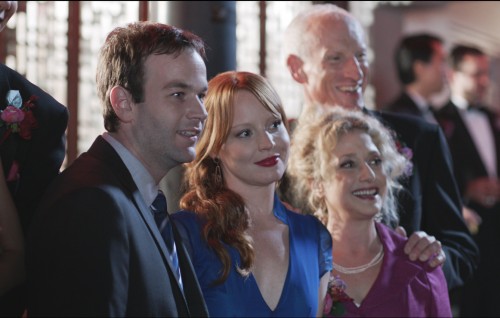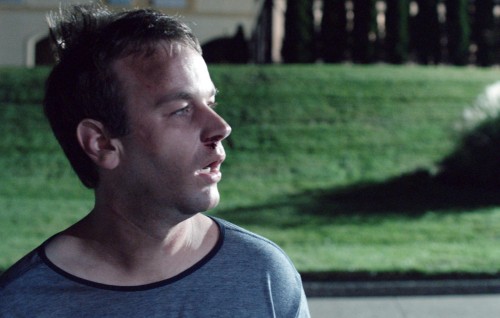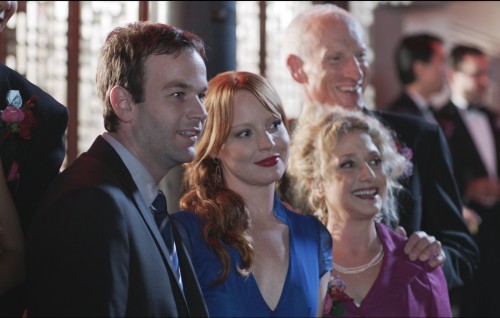
If Sleepwalk With Me does one thing well, it’s strike a balance between truth and delusion. For a film that grounds itself so heavily in reality while simultaneously reveling in the dreams of its protagonist, equilibrium is paramount; mercifully, the line between waking life and fantasy is never irreparably, irresponsibly blurred. We may not be able to immediately identify when our protagonist is dreaming– neither can he– but Sleepwalk With Me clues us in quickly enough so as to avoid leaving us in the lurch, establishing a clear relationship between the stages of awareness experienced by Matt, the aimless, disconnected, would-be comedian serving as our anchor.
And why not? Dreams aren’t just a gimmick here, but rather plot-driving beats that inform the thrust and direction of the whole story. Matt might have some zany stuff bouncing around in his head, but that’s no reason not to treat it all with care. REM behavior disorder, after all, is pretty serious, even if the condition leads Matt to act out outrageous scenarios ranging from dust buster Olympics to dodging assassination attempts carried out by rival comics. Sleepwalk With Me scores by delighting us with these flights of fancy, but the aftermaths of Matt’s dreams are often quite as sobering as the realization that his activity comes from the strain of professional failure and the crushing weight of a relationship he knows deep down he shouldn’t be perpetuating.
Sleepwalk With Me is such an effort of collaboration that it’s difficult to ascribe credit to each individual answerable for its screen birth succinctly. The narrative stems from the mind of Shrewsbury-born Mike Birbiglia; it’s based on his one-man show of the same name, which is itself founded on the events of his own life. The film is co-directed by Seth Barrish; it’s co-written by Barrish, Birbiglia’s brother Joe, and This American Life‘s Ira Glass. For some of you that may mean that Sleepwalk With Me sounds awfully familiar, and your experience watching it may vary if you’ve either seen Birbiglia’s show or listened to Glass’s radio program (which featured an excerpt from Sleepwalk With Me in its 361st installment). For everyone else, you’re in for a brutally honest and relentlessly funny exploration of Mike’s/Matt’s innermost complexes and emotions.
That core endeavor leads to a rather awkward moment about halfway through the film that manages to support the production’s adherence to reality while also acting as a dramatic turn-off. Birbiglia deserves a lot of praise for being bold enough to put himself out there as he has here (an effect that, I assume, is even more pronounced in his one-man show), but that fearlessness becomes somewhat curbed when Matt reminds the audience– by breaking the fourth wall, which he does frequently throughout the film– that we’re on his side. It’s not about sides, Matt; it’s about being willing to wear your flaws on your sleeve. Sleepwalk With Me loses some of its backbone here– we’re never on his side in the sense that we intentionally overlook his less admirable qualities, but we certainly want him to succeed and attain some form of peace and closure. His request ultimately feels like a plea. Maybe this works better in the stage show, but in the film it feels dramatically deflating.

But it’s a minor misstep; we never go back to that comment, only forward, where we get to see Matt/Mike make some terrible, tough choices. He’s easy to sympathize with; apart from the mayhem he perpetrates in his sleep, most of what he deals with as a human being is universal. (Which could exacerbate the unnecessary appeal to our loyalty as viewers. But I digress.) He doesn’t know how to make his relationship with the beautiful Abby (Lauren Ambrose, at her radiant, vulnerable best) work, or how to sever his ties to her, he’s crippled by doubt over his career missteps and shortcomings, and he lacks the agency to achieve his goals. He’s meandering, and at one point or another all but the most self-possessed of us have been there. And so he retreats to his dreams.
It’s less overt than it sounds; Matt’s mostly just too much of a slacker to make his own appointment with a sleep specialist, and chooses to shirk the appointments his father (the great James Rebhorn) makes for him in favor of doing stand-up shows as he starts to develop his voice as a comedian. Matt isn’t letting his REM disorder continue because he actively recognizes it as a safe haven from life, but he certainly doesn’t want to explore what the emergence of his nighttime antics might say about him and his life. And no wonder– his dreams are vivid, wacky, often hilarious, and superbly realized, standing among the best scenes in the entire film. Dangerous though they may be, Sleepwalk With Me find a certain joy in them that’s hard to resist, although the film diligently brings us back to the severity of Matt’s situation when it matters most.
G-S-T RULING:
Ultimately, the film maintains a lightheartedness and charm from start to finish; there’s a sense of mirth that’s inextricably bound to the movie’s very nature. Not to say that Sleepwalk With Me sugarcoats the great personal truths Birbiglia examines through his craft, as the movie refuses to compromise the essence of his story. Sleepwalk With Me goes to some somber, uncomfortable places to get to the other side of Mike’s yarn, nothing truly dark but nothing that you might find in similar Hollywood fare. But by playing close to the heart without being cloyingly disingenuous, the film manages to take us through the lows and the highs of its principal’s adult life, dabbling in illusion while remaining staunchly tethered to what’s real.




